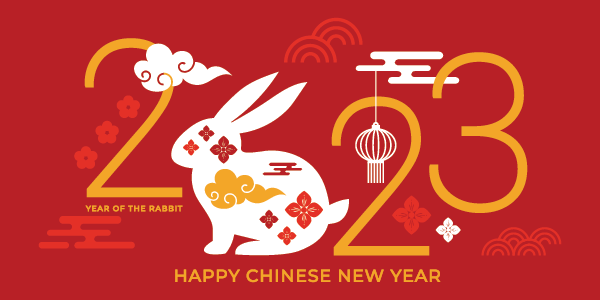
Happy Chinese New Year!!!
This Sunday, Jan. 22, 2023, marks the first day of the Chinese lunar calendar for this year—the Year of the Rabbit. In light of this significant holiday, I’d like to share some information about Chinese New Year:
-
What: Like the western New Year, Chinese New Year is a celebration of new beginnings and sets the tone for the rest of the year. Having been celebrated for over 4,000 years, it is rife with festive traditions, foods, and customs to rival that of most other major holidays. It is a time for families to reunite and be merry! Having a large extended family, I remember going to gatherings on both sides of my family with upwards of 40-50 people. There was a lot of eating, drinking, catching up and teasing from aunts and uncles you haven’t seen since last year.
-
When: Chinese New Year follows the lunar calendar which means it doesn’t follow the typical Gregorian calendar and celebrations begin seemingly at different times of the year. The holiday usually falls sometime in January or February. This year, the celebrations will start on Chinese New Year’s Eve on Jan. 21 and will technically go until Feb. 5—about 16 days! However, it is only observed for about seven days out of the year. It is a major deal and most countries that recognize it shut down school and other services. For an Asian American, like me, we mostly celebrated one or two days on the closest weekend to the New Year due to the limitations of school and work.
-
Who: This momentous holiday is celebrated worldwide by several different Asian communities. Though named “Chinese” New Year, the holiday is also celebrated by other Asian countries—Taiwan, Vietnam, Thailand, Singapore, Cambodia, Malaysia, Indonesia and more! Historically, China has had tremendous influence in these southeast Asian countries and this holiday has remained an important part of the year for them. So, although, your friend may not be Chinese they may still recognize this holiday and practice the same traditions. I am Vietnamese and my family celebrates this holiday every year.
-
How: The how of celebrating Chinese New Year is probably the biggest (and most fun) aspect to discuss. The practices of Chinese New Year are rooted in tradition—and some superstition:
-
It is thought the new year sets the tone for the rest of the year. For example, it is loosely believed that the events of this first day of the year will also occur for the rest of the year. My mother used to jokingly tell me not to make her mad on the first day of the year because she’ll be mad at me the rest of the year. So…don’t make your loved ones angry on Sunday! In the same vein, don’t borrow money on this day because you could be borrowing money the rest of the year—not great for residents and fellows who are already in tremendous debt.
-
Food, food, and food! There are special foods that are traditionally only eaten during the New Year—from the sweet to the savory. There is often plenty of fruit, candy, and pastries. For the meal, it is often eaten potluck style with various dishes focusing on the idea of wholeness associated with them such as a whole roast pig, roast duck or dumplings that can be eaten whole.
-
Don’t clean or get cleaned up! The thought is that using scissors or cleaning will cut or sweep away your good fortune for the year. So, most people do their house cleaning leading up to Chinese New Year.
-
Traditionally, red envelopes are given to loved ones during the Chinese New Year. These envelopes contain some small amount of spending money. I loved this tradition as a child but now that I’m the one giving out envelopes, it’s not quite as much fun! Other gifts can also be given like oranges, dragon fruit, and yuzu but avoid giving out clocks, pears, plums, shoes, and umbrellas as these are Chinese homophones or representative of bad omens.
-
Lastly, good health is an important subject of Chinese New Year. As it represents new beginnings and the end of the prior year, people are focused on longevity. When I give my grandmother her red envelope every year, I tell her “Happy New Year! I hope this year brings you good fortune and great health to live over a hundred years!” Along with this, most people avoid taking medicine (outside of those needed for chronic disease), avoid injury, and avoid seeing the doctor (maybe that’s why my aunt was avoiding me last year…).
-
On Feb. 5, the end of the Chinese New Year celebrations, there is a lantern festival celebrating the Zodiac sign for the year. This year is the Year of the Rabbit which symbolizes longevity, positivity, cleverness, and self-protection.
Thanks for reading my excerpt on this holiday! I hope that this has been informative and gives you a glimpse into this HUGE celebration.
Hugh Quach, M.D., MBA
Pediatric Critical Care Fellow